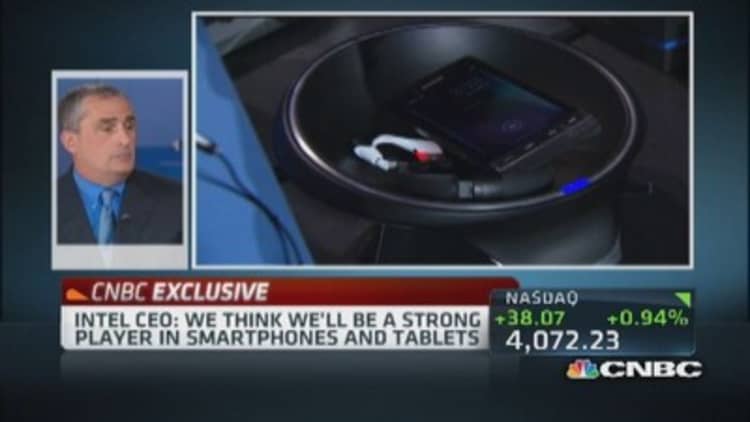
Intel's consumer business is showing signs of stabilizing, CEO Brian Krzanich said Wednesday.
"If you take a look at the mature markets—you know, Western Europe, the U.S.—we're seeing strength in the enterprise and some stabilization at the consumer level, as well," he said. "But as we move into the emerging markets, it becomes much more an enterprise play for us right now, and the consumer is still showing weakness."
On CNBC's "Halftime Report," Krzanich told Jon Fortt that there was slightly more weakness in China. "But in general, you go across the world, enterprise much stronger than the consumer right now."

Intel reported quarterly earnings this week that beat analysts' estimates and revenue that met forecasts, while its revenue outlook fell short of expectations.
Read More Intel earnings top forecasts; revenue outlook falls short
Touching on the PCs, Krzanich said that while there has been a slowdown in sales, the market is poised for a rebound as users replace aging machines.
"They still use it in the enterprise," he said. "They still use it heavily as a work tool."
Krzanich also said that he viewed the tablet market as a growth area for the chipmaker.

"We think we can bring a lot to the tablet and smartphone arena. We are going to go in and say we can play at the low end and play at the low price points, and you see us doing that," he said. "We are also going to bring a lot of innovation to tablets."
Krzanich cited such technology as Intel's 3-D cameras, which it demonstrated at CES.
"That, we think, will drive people to higher price points because of the capabilities those have," he said, adding that it was a component in the next-generation "internet of things," or wearables." And so, we think this is required in order to win down there, as well."
Krzanich also said that the company had taken steps to eliminate its reliance on so-called "conflict minerals," after having it brought to its attention by the Enough Project.
Read MoreAmazon's 3-D phone is terrible: Pro
"This is bad. This shouldn't be happening, and you don't want your company – the company you've been at for 30 years – to be a part of that," he said. "If we could be role models and show it could be done, and done with no added cost, no extra complexity, then others would follow."
—By CNBC's Bruno J. Navarro. Follow him on Twitter @Bruno_J_Navarro.


